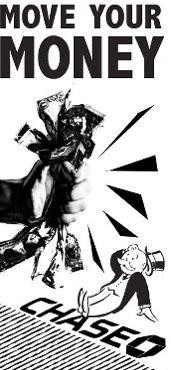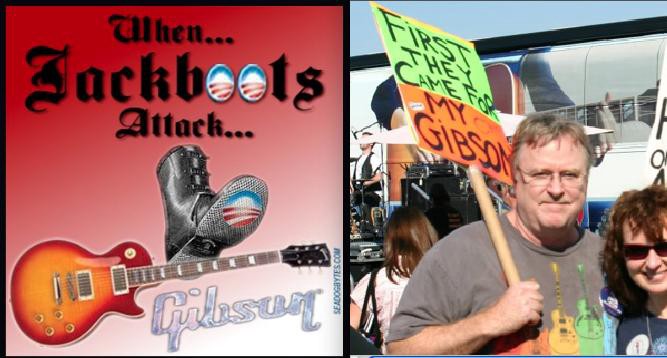Florida's Tea Party Economics Plan a Total Failure
“Gov. Rick Scott and the Florida Legislature face a $1.5 billion revenue shortfall, state economists said Tuesday….The projections are not what lawmakers had in mind last session when they cut regulations, slashed spending and eliminated more than 4,000 state jobs to balance the $69 billion budget…. Lawmakers also turned away billions in federal transpiration [um, sic?] and health care money, and tried to boost the economy by including $70 million in tax incentives.”
— Well, there you have it.
Places to Protest And/Or Avoid This Week, Depending on Your Inclination
Places to Protest And/Or Avoid This Week, Depending on Your Inclination

I mean, I’m all for marching on the Upper East Side, particularly on Jamie Dimon’s house, in part because who doesn’t love stopping in at the Tom Ford store, but you know if your protest is based in the Financial District, you don’t really have to hike that far. (Though some good old ones are up there, sure!) You want plutocrats? Average price per square foot on residential real estate is higher in Soho and TriBeCa than it is on the Upper East Side. At least you could just stop at Gramercy and the Flatiron, where in new developments, the neighborhood is “the only part of Manhattan to average more than $2,000 per square foot.” Plus you can stop by Paz de la Huerta’s house in TriBeCa and you can save wear and tear on your poor people shoes, which don’t last long, as they were made by such tiny delicate fingers overseas.
And don’t forget we’re making new friends all the time! Likely “10,000 financial-services job cuts in New York City by the end of 2012,” and then they’ll be out there on the streets protesting too.
Meanwhile, in other upcoming events, mark your calendars, if you like (either to be present or to be out of the way): today at 3 p.m., it’s a march on Chase bank; Saturday, people march from Liberty Square on Chase bank again to support customers closing their accounts; and then, later Saturday, at 5 p.m., it’s the occupation of Times Square. (Spoiler: that’s not going to end well!)
Just How Many Active Serial Sex Predators Are There in Park Slope?

A plausible suspect in the serial assaults in greater Park Slope has been held for questioning; he was caught in the act, or at least “an act.” But police are saying that they believe there’s more than one of ’em. In fact, they have “four sketches of suspects on display” at the station. (AND HOW DEPRESSING IS THAT?) Some news: here are some free self-defense classes in Brooklyn; Safe Slope is still offering walks home for ladies and other folks who may feel vulnerable.
Man Finishes Job

“By point of context, though, an aisle orchestra seat at the Metropolitan Opera for Donizetti’s ‘L’Elisir d’Amore’ runs $330, also excluding wine.”
— I am a huge sucker for departing Times restaurant critic Sam Sifton, but I do recognize that he is probably the most divisive person in that position since Ruth Reichl started flinging stars at Chinese joints. In any event, this sentence from his final review, in which he designates Per Se as New York’s best restaurant, echoes on SO MANY LEVELS that even if I were disinclined to enjoy it I would still need to doff my cap.
Photo by Peter Bond, via Flickr
A Supposedly True Thing Jonathan Franzen Said About David Foster Wallace
by Michelle Dean

There’s really no delicate way to put this: at this year’s New Yorker Festival, Jonathan Franzen said that David Foster Wallace fabricated at least part of — and potentially a large part of — his nonfiction pieces. I wasn’t there, but after reading Eric Alterman’s summary Friday, and finding no mention of the incident in any other coverage of the festival, I watched the conversation online.
Here’s a rough transcript of the relevant exchange (with some “umms” and “uhhs” edited for reasons of intelligibility).
Remnick: Well, I was, I was fascinated to hear… that there are some people in this world who feel that it’s o — that to have a kind of hyper-postmodern view of nonfiction/fiction questions, that it’s all writing, and that questions of fact, facticity and, well, that’s kind of square and old-fashioned, and it’s okay that Kapuscinski does what Kapuscinski does and kind of makes this up because it’s really just a metaphor fo Poland itself. And other writers that one could name who have a different view of fact and fiction… You’re pretty strict about the dividing line. You see, you think that somebody who’s —
Franzen (interjecting): [unintelligible]
Remnick: — allegedly writing nonfiction and cheats it —
Franzen: Yeah.
Remnick: — is cheating the reader, is somehow in a way that should be kind of like admitting a false —
Franzen: David and I disagreed on that.
Remnick: David?
Franzen: Dave Wallace, yeah.
Remnick: So Wallace felt well —
Franzen: Yeah, cause he —
Remnick: He said it was okay to make up dialogue on a cruise ship?
Franzen: For instance, yeah. Uhhmmm…
Remnick: I’m heartbroken to hear it.
Franzen: I know, I know. No, those things didn’t actually happen. You notice he never published any nonfiction in your magazine.
Remnick: Not for want of trying but that’s another matter, but but…
Franzen: He would have had to, maybe he…
Remnick: He would have fell before the fact-checkers.
Franzen: I think the fact-checkers… and, to me, the fact-checkers, we, uh, I’m so afraid of fact checkers.
Remnick: Good. [laughs]
Franzen: But that’s, you know, that’s kind of like the boundary lines in tennis. That was a great shot, only problem was it was two feet behind the baseline. I will have crushed…
Remnick: But David called it in.
Franzen: Well, yeah, I mean… I love that cruise ship piece of Dave’s, so I’m not, I’m not… it was, yeah, two somewhat different approaches.
From this vantage, it’s very hard to say whether Franzen’s charge is (a) true (oh, what a fraught word in this context) or (b) new information. So much plainly depends on how you parse “Those things didn’t actually happen.” Franzen can’t possibly mean that all of the events recounted in “Shipping Out,” Wallace’s famous piece on cruise ships (later retitled “A Supposedly Fun Thing I’ll Never Do Again,” in the book of essays of the same name) never occurred? Or can he? He’s responding to a question about dialogue; is his answer limited to that? Is this only true of the cruise ships piece, or of his other essays as well? (“For instance” seems to indicate the latter.) In the video, Remnick appears taken aback by the admission, and perhaps that explains why he didn’t press the matter. Until Franzen decides to elaborate we are left to guess at what precisely he meant.
It’s possible Franzen thought that this wouldn’t surprise anyone. In interviews, Wallace admitted to massaging certain elements of his nonfiction. In a 1998 interview that Tom Scocca put up at Slate last year (a shorter version had previously run in The Boston Phoenix), Wallace said that he cleaned up quotes in the essay, for example, taking out “likes” and adjusting punctuation, without apology. Moreover, “The thing is, really — between you and me and The Boston Phoenix’s understanding readers — you hire a fiction writer to do nonfiction, there’s going to be the occasional bit of embellishment.” Wallace also told David Lipsky, in one of the 1997 conversations that make up Although Of Course You End Up Becoming Yourself, that he had, in “Ticket to the Fair” (later “Getting Away from Already Being Pretty Much Away From It All”), put “somebody else’s voice” into the person of the Native Companion, a figure who accompanies Wallace to the Iowa State Fair and plays the knowing commentator to Wallace’s bewildered straight-man persona.
On the other hand, Wallace was quick to reassure his interlocutors that he was committed to telling the truth. In the interview with Scocca, Wallace wrung his hands about the Janet-Malcolm-style betrayal he felt he’d commited toward two of the subjects of the cruise piece, a couple he’d met, the female half of which he infelicitously described as “Jackie Gleason in drag”:
That, that was a very bad scene, because they were really nice to me on the cruise. And actually sent me a couple cards, and were looking forward to the thing coming out. And then it came out, and, you know, I never heard from them again. I feel — I’m worried that it hurt their feelings…. I couldn’t just so worry about Trudy’s feelings that I couldn’t say the truth. Which is, you know, a terrific, really nice, and not unattractive lady who did happen to look just like Jackie Gleason in drag.
And in his conversation with Lipsky, Wallace continues: “Nothin’, nothin’ in there is made up. That’s so weird, I’ve never done something — well, maybe the baton twirling wasn’t quite the carnage that… Although it seemed awfully dangerous at the time.”
And, of course, both of the pieces in question — the cruise piece and the Fair piece — were published in Harper’s Magazine. They were edited by Colin Harrison, now at Scribner, who so far hasn’t commented on the matter (including to us; we contacted him by email but no reply so far). However, one former Harper’s editor, Donovan Hohn, who worked there after these essays were published, did offer this on Twitter:
@donovanhohn
Donovan Hohn @maudnewton, @alexheard Harper’s FC process in my experience (‘98-’11) was as rigorous as other mags I’ve experienced if not more
Oct 08 via webFavoriteRetweetReply
@donovanhohn
Donovan Hohn @maudnewton, @alexheard Which doesn’t mean it was foolproof.
Oct 08 via webFavoriteRetweetReply
So either all of Wallace’s affirmations are dissembling, and Harper’s was duped, or something else was going on.
My authority to comment, I must admit, comes only as a literary-gossip addict who probably needs to find better things to do with her time than obsessively track mentions of the Wallace-Franzen friendship. (I hear there’s a class war going on somewhere around here.) But in that fanatical mode, I find the most likely explanation for the gulf between “those things” not happening and “occasional bit of embellishment” resides somewhere in the rapidly expanding (if you’ll permit me) footnote of Franzen’s own relationship to Wallace.
Take, for instance, a few things about the exchange not captured in the transcript. Although it does follow a line of questioning about Wallace and Franzen’s friendship, and the influence they had on each other, the information above is volunteered as a quasi-non-sequitur: Remnick had already moved on to asking about Franzen’s own nonfiction. And as Remnick goes into that preamble, Franzen hunches over, fiddles with his glasses and his nose, and nods absently. When he starts in by saying “Dave and I disagreed on that,” he’s looking at his lap, and only meets Remnick’s gaze mid-sentence. And then he breaks into a grin.
You no doubt have your own reading of those non-verbalisms. Here is mine: they add up to a person who has made a conscious decision to disclose this. He was not caught in a trap of questioning; he had a moment to himself, to reconsider his first reaction. But — and here I report only my own impression — there didn’t seem to be any malice in it. In fact, I’d say there is a lot of mischief in the smile Franzen wears throughout.
That is a shining example of the Franzen paradox: even as he’s making what many others — and, by his own account, he himself — would consider a very serious charge against his friend’s work, he seems to believe himself to be doing so in a spirit of affection. The gap between his self-perception and ours is his trademark, one reason why so many find it tempting to, well, you know, dislike him.
Nowhere was this more apparent than in the piece he wrote about Wallace for The New Yorker in April. It begins with Franzen’s trip to Masafuera Island and ends in an uncomfortable limbo between a screed and an elegy. The lead is buried in long disquisitions about lonely islands and Robinson Crusoe, which manage to make the essay come across as, at once, both ponderous and searingly, emotionally transparent. The anger Franzen professes to feel is quite plainly acknowledged — early on he admits “to [taking] refuge in anger and work” after the suicide — but then resurfaces in unacknowledged ways as well. This keeps him careening headlong into oversimplified diagnoses of depression-as-boredom and “infantile rage” and “suicide as a career move.” (He seems to resent, too, the reductive readings others have given Wallace. “People who had never read [Wallace’s] fiction, or had never even heard of him, read his Kenyon College commencement address in the Wall Street Journal and mourned the loss of a great and gentle soul,” he writes in that New Yorker piece. And to Lipsky, in Rolling Stone (not online), he notes, “But he wasn’t Saint Dave.” The instinct to puncture that legacy might, I think, be something Wallace would have understood. “You get to decide what you worship,” he said, in that commencement address. But, other than an actual deity, “pretty much anything else you worship will eat you alive.”)
In Evan Hughes’ piece in this week’s New York, Elizabeth Wurtzel says of Franzen’s early days that even “[o]n a sunny day it would be raining on Jon Franzen.” Anger, sadness are surely nothing new to him. But it shouldn’t be difficult for anyone to understand why that strain was amplified after Wallace’s death. Franzen gives it to us himself in the piece:
The depressed person then killed himself, in a way calculated to inflict maximum pain on those he loved most, and we who loved him were left feeling angry and betrayed. Betrayed not merely by the failure of our investment of love but by the way in which his suicide took the person away from us and made him into a very public legend.
and:
To prove once and for all that he truly didn’t deserve to be loved, it was necessary to betray as hideously as possible those who loved him best, by killing himself at home and making them firsthand witnesses to his act.
In a faint echo of the (frequently too academic) debate about the distinction between fiction and nonfiction, the question of whether or not either of these statements are empirically true, as descriptions of Wallace, strikes me as beside the point. The relevant question is to ask whether, as descriptions of Franzen’s agony over his friend, they are honest.
The more you read and watch and hear about the Wallace-Franzen friendship, after all, the more the festival incident begins to look like just another salvo Franzen tossed out into the ether, wishing it would boomerang back to him. In the Remnick talk Franzen actually characterizes the dynamic of the friendship as “competitive wounding,” and though he’s speaking of trying to move each other by the emotional power of their manuscripts, the facts do seem to point to that as the larger theme. In my obsession with this subject, one of the more entertaining artifacts I’ve come across is this video of the two — plus an unfortunately clad Mark Leyner — squaring off on “Charlie Rose.” Watch it. My favorite moment comes around the 11-minute mark, when the two of them argue in a way at once aggressive and affectionate, about some high theory of contemporary fiction. You can take that minute, I think, as conclusive evidence that the whole tale Franzen is spinning to us just might be true.
But then, of course, be it about a cruise ship, or about lost friends, it might “only” be a story.
Michelle Dean’s writing has appeared, among other places, at Bitch, The American Prospect and The Rumpus. She sometimes blogs here.
Photo by david_shankbone, via Flickr.
A Nation Changed: Our New Era After "The Avengers" Trailer
“It’s hard to imagine that just 24 hours ago, we only had a vague, general sense of what The Avengers film would look like. Which is to say, we knew exactly what it would look like, having seen 20 Marvel films in the past few years. But how could we trust our own instincts?”
— From here, I can hardly remember yesterday.
Steal This Occupy Wall Street
by Abe Sauer
@michellemalkin
Michelle Malkin Not if PlannedParenthood “helps.” MT @marklotto There are going to be so many #occupywallstreet babies 9 months from now
Oct 10 via TweetDeckFavoriteRetweetReply
The hubbub around the Occupy Wall Street movement is getting ugly, and the ugly looks like it’s going to spill right into the 2012 cycle. Over the next year we can completely regurgitate the language of our the 1960’s generation, and, who knows, maybe even top it off with a ‘68-like party convention meltdown. Unhinge your jaw and get ready to swallow the rat whole and still breathing, America. The silly season is going to be sillier than ever.
In addition to accusing the bum protesters of turning New York into the filthy sewer that they’ve always accused New York City of already being, conservatives are desperate to inject the Occupy Wall Street movement with some good old American culture war. So far — so far — it’s not working.
Plenty have rushed in to cast the movement in the stereotypical language of the 1960s. Summing up the protesters, the Daily Caller’s Matthew Boyle dug deep and used a criticism of the working class that hasn’t lost a step since The Road to Wigan Pier.
I just did a walkthrough of #OccupyDC protests in McPherson Square. Maybe 75 ppl there. And u could smell them from a mile away!Mon Oct 10 20:11:45 via TweetDeck
Matthew Boyle
mboyle1
Boyle sure has come a long one-eighty since slamming Christian proselytizers while at Boise State.
Tea party porn director James O’Keefe was spotted at Occupy Wall Street in an outfit as over-the-top as his ACORN-assassinating pimp costume. With his banker collar and horn-rimmed spectacles, O’Keefe was clearly hoping to bait some protesters into a violent altercation, proving to his followers that they are all the patchouli pacifist hippies flower children they’re painted to be.
Meanwhile, one American Spectator editor named Patrick Howley, undercover as a protester, helped lead an ill-informed raid on the Air and Space Museum in D.C. After being pepper sprayed, Howley sat down and pounded out a report that indicted the protest. Except, in his passion, he also indicted himself as a leader and escalator of the event. The American Spectator has since edited his report with no correction. (The original is here. Update: We’ve been told that is actually not even the original, that it’s an early revision. This is said to be an original, though we don’t know that first-hand. The differences are intriguing.)
A few days earlier, Michelle Malkin went on Fox and Friends and slammed the protesters, claiming Apple’s founder for the conservative right as the “miracle of the spontaneous order of capitalism.” Jobs had not been dead for 24 hours.
https://www.youtube.com/watch?v=izLPv9SM5Ao
That Jobs’ giving from the late 1990s through 2010 includes such conservative luminaries as Bill Bradley, Ed Kennedy, Rahm Emanuel, and — uh oh! — Nancy Pelosi was not going to get in the way of Malkin making a point.
Back in January, we asked if the 99ers would become the answer to the Tea Party. While many credit the youth that now occupy Wall Street as the spark, 99ers, those who have reached the end of their unemployment benefits, were protesting Wall Street back in August of 2010. Now, the 99ers are organizing to join “the 99 percent.”
So a protest movement that wasn’t worth anyone’s time just a couple weeks ago, and was barely worth even ridiculing 13 months ago, is now a circus. Occupy Wall Street has all of the engaging class struggle zeal, anti-Wall Street and corporate influence pizzazz and huge turnout numbers of the month-long Wisconsin protests six months ago, but right in the media’s backyard and without any of the tedious need to go to Wisconsin. The event has even become a must-stop on the self-promotional tours of Kanye West, Michael Moore and Keith Olbermann. (A Glastonbury, except for assholes.)
But don’t worry everybody, Al Sharpton is there too, reports TMZ!
And as the Supreme Court has ruled, corporations are assholes too. So Ben and Jerry’s endorsed the protest, using the “stand with ____” declaration that’s become the common go-to language of the sloppily politicized. The whole thing was probably a good inside joke with the ice creamery’s billion-dollar Unilever conglomerate owners, which is battling unions over a plan to close its pension plan.

That sort of battle is going around these days. The next day in Nashville, Tea Party groups held a “We Stand with Gibson” rally in support of the guitar maker’s ongoing battle over wood imports with Obama’s “jackboots” at U.S. Fish and Wildlife Services. The Nazi allusions were numerous.
Then a guy defecated on an NYPD squad car.
Is America not entertained? It will be when a whole new generation meets the third party nominee, Pigasus. He’s back.
Abe Sauer can be reached at abesauer at gmail dot com. He is on Twitter.
Hold Out, Short Guys, Your Younger Wives Will Show Up Eventually
“Women care about height and for many short men who are looking for a wife that means either settling for one who is less attractive or not finding one at all. There is a silver lining though: a short man who is able to establish himself economically could very well find that later in life he has a younger wife than his taller friends.”
Meek Mill Featuring Rick Ross And Yo Gotti, "Don't Panic"
It’s strange to see Rick Ross eating a bowl of Super Sugar Crisp in this new video for his protege Meek Mill. Because we recently learned that Ross usually wakes up to a bowl of lobster bisque. What this has to with his being a narcissist, as he says, is less clear. And considering how much milk he spills into beard, he’s probably better off sticking with the cereal anyway. Both Ross and Meek Mill have terrific voices. (Yo Gotti does, too.) Their lyrics often leave me flat, but as long as Maybach Music Group producers keep using those big gonging church bells to the thrilling effect that they have been lately, I don’t much mind.
Florida Florida
I’m kind of amazed that we are still arguing about fluoridating the water here in 2011, but I guess I shouldn’t be, because THIS WHOLE COUNTRY IS CRAZY, especially Florida. [Via]
